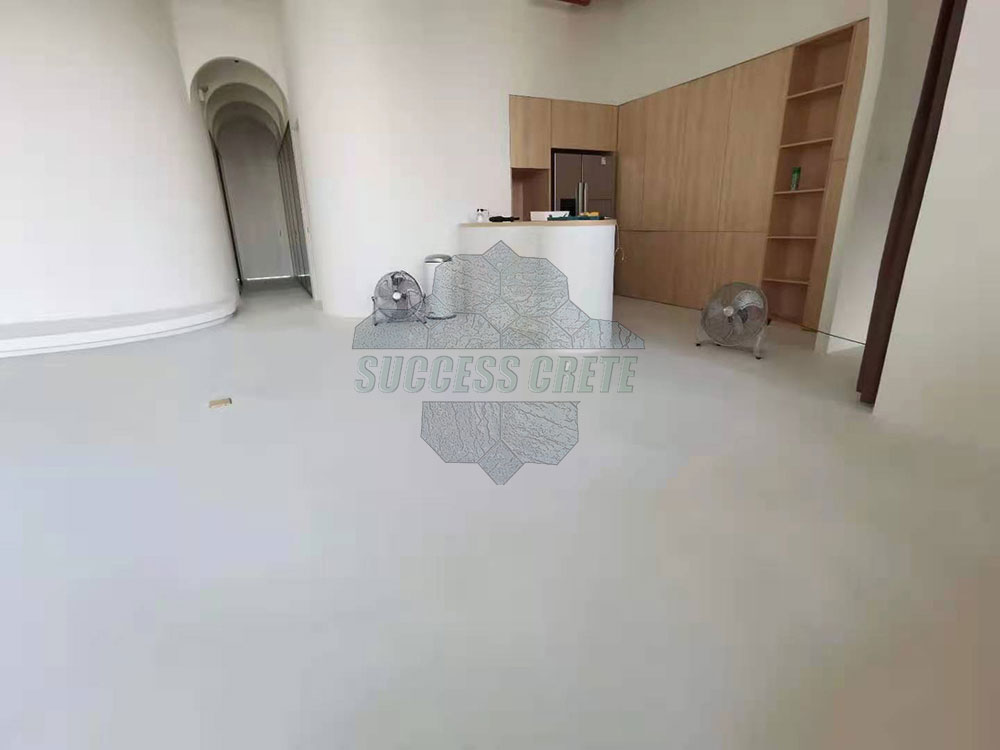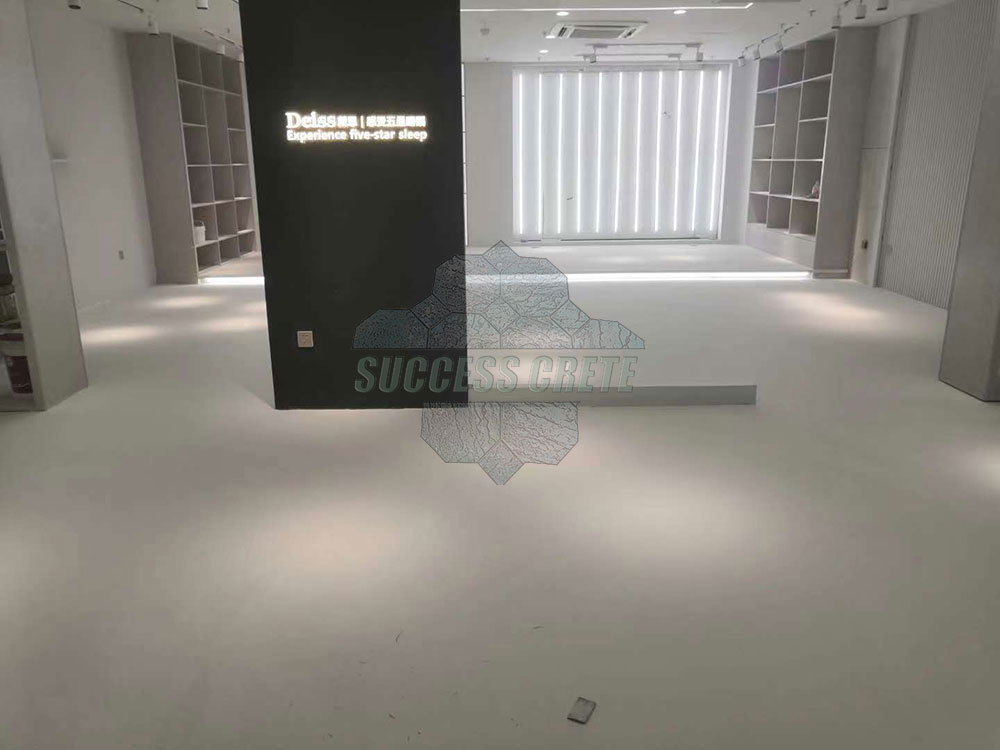Introduction
So, you want to spruce up your home? How about getting rid of that old and drafty floor for something more modern? And let me take you through Self-leveling concrete pros and cons!
The concrete floors in your home are probably not looking great ,they’ve been subject to years of wear and tear, so you might as well give them a fresh coat or two before it gets worse!

Luckily there is an easy way around this problem: Self-leveling flooring material will allow for quick correction by simply sprinkling more cement powder over areas where needed until they meet exactly halfway across – no tools required at all!
The end result? A beautiful new layer that makes every room pop with style once again.
If you’re in the market for a new concrete surface, you may wonder if self-leveling concrete is the right option.
This type of concrete is designed to be poured over an existing surface, creating a smooth finish.
It’s been gaining in popularity in recent years, but does it really live up to the hype?
And do you know any Self-leveling concrete pros and cons?

In this post, we’ll take a look at the pros and cons of self-leveling concrete to help you decide if it’s right for your project in 5 parts.
- What is self-leveling concrete?
- The advantages of using self leveling concrete
- The disadvantages of using self leveling concrete
- The best use for self-leveling concrete
- How to use self leveling concrete correctly
What is self leveling concrete?
self-leveling concrete is a type of concrete that is designed to flow into place and self-level. It is often used for repairing damaged concrete surfaces or filling in voids.
Self leveling concrete is made with a Portland cement base and admixtures that help it to flow easily.
It is also typically pourable, so it can be placed using a pump.
It can be used on both interior and exterior surfaces, and it can be tinted to match the surrounding concrete.
When self-leveling concrete cures, it forms a strong bond with the existing concrete surface.
The self-leveling concrete is a type of material made from modified polymers.
This unique property means that it does not require large amounts of water to mix, which makes for an easier and more flexible construction process than other types with similar properties such as sand or cement mortar used in traditional building materials.
Self-leveling floorings have higher levels of compressive strength meaning they won’t break when the pressure’s applied so this allows you to build flat surfaces without worrying about things crumbing up at your feet while driving over them.
Self-leveling concrete is the most important mechanical advance in solid business.
It has properties that make all kinds of open doors imaginable with ordinary cement, but it also offers new design features and higher plasticity when compared to other materials used for building projects.
A self-leveling compound can be thought about as an extension of the top size of your common construction problems – offering similar or advancing solutions depending upon what you need to be done!
In order to achieve their independent execution highlights and flow volumes, it is expected that a higher cement composition will yield greater strength.
In addition, the lower water-to-solids ratio of co-blends requires special care when measuring high-volume waters with polycarboxylates due to their altered consistency which reduces mixture functionality.
Sometimes slow mineral fillers like limestone powder are used in order for stability or to avoid separation during the production process.

Self-leveling concrete pros and cons
The advantages of using self-leveling concrete
Self-leveling concrete is a type of concrete that is designed to flow into place and level itself out.
This makes it ideal for use in a variety of applications, including floors, countertops, and driveways.
Self leveling concrete is also much easier to work with than traditional concrete, as it requires no troweling or finishing.
In addition, self leveling concrete can be applied in thin layers, which helps to reduce weight and save on materials costs. self leveling concrete is also very strong and durable, making it an ideal choice for both commercial and residential applications.
The self-leveling concrete is a revolutionary material that can be effortlessly installed in tight spaces and complex formwork.
It has just enough water to make it through the process without becoming too sturdy or difficult, yet still provides great quality transformation for your project’s needs!
Key benefits of this product include filling cracks in floors, leveling surfaces with varying heights, and having a high compressive strength so it can withstand pressure.
It does not require large amounts of water to mix; instead only enough for mixing is needed when installing the finish coat which allows you to get creative by adding color or decoration if desired!
Self-leveling concrete is perfect for many residential applications, including patios, pool decks, driveways, and walkways. Its malleability allows it to be poured into any shape or form desired and therefore can fit any project’s aesthetic needs.

self leveling concrete is a type of concrete that can be used to create a smooth, level surface.
It is commonly used in commercial and industrial applications, as well as in residential settings.
There are several advantages to using self leveling concrete, including the following:
self leveling concrete can be applied quickly and easily, without the need for specialized equipment or training.
self leveling concrete can be used to create a variety of different finishes, from highly polished to textured.
self-leveling concrete is extremely durable and long lasting and is resistant to cracking and chipping.
self-leveling concrete is also low maintenance and does not require regular sealing or waxing.
self-leveling concrete is an eco-friendly option, as it contains no volatile organic compounds (VOCs).
self-leveling concrete can be used in both indoor and outdoor applications.

Self-leveling concrete pros and cons
The disadvantages of using self leveling concrete
Self leveling concrete is a great choice for a number of reasons. It’s efficient, durable, and can be installed quickly.
However, there are some disadvantages to using self-leveling concrete that you should be aware of before making a decision.
self-leveling concrete is a type of concrete that is often used in construction projects. This type of concrete is designed to be spread evenly and smoothly, making it ideal for creating flat surfaces.
However, self leveling concrete has several disadvantages.
First, self leveling concrete can be difficult to work with and can require special equipment.
Second, self leveling concrete can be expensive, and the cost of the project can quickly add up.
Finally, self leveling concrete can be challenging to remove if it is not applied correctly.
For these reasons, self leveling concrete is not always the best choice for every construction project.
Dries very quickly and therefore is not suitable for prolonged use.
Needs to be mixed properly, otherwise, clumps may form.
Cannot be used on wood subfloors as it may loosen.
Does not adhere properly to dirty or soiled floors.
May disintegrate if mixed with additional water.
How to use self leveling concrete correctly
We all know about Self-leveling concrete pros and cons and how important it is to maintain the conditions in your home so that you can enjoy living there.
But did you also realize just what happens when things go wrong?
Moisture deep inside a slab will eventually make its way up through cracks and onto surfaces, which could lead to not only serious problems but expensive ones too!
Researchers have found a way to measure moisture deep inside concrete slabs with an in-situ probe.
This scientifically proven test will allow us more accurate readings and help determine whether there’s enough water for harmful bacteria or fungus growth, which can lead to structural damage such as a plaster ceiling collapse.
The researchers study how much humidity is present at various depths within these construction materials so they created one called the “Relative Humidity Test”.
Self-leveling concrete is the best thing since sliced bread! It’s easy to use, and you don’t have to mix it with tons of water like other materials. Let me show how self leveling works in a home or commercial project
Be sure that the floor is completely dry before you start sweeping. A wet surface will only make things more difficult for you and might even damage your new wood floors!
If you see evidence of standing water near one area (like an exposed drain pipe), cover those areas with industrial tape so as not to cause more damage than needed; otherwise, once concrete begins flowing around these fixtures during setup time-it’ll only get worse without proper protection against corrosion chemicals like salt road weathering influences–which can lead quickly towards cracks.
The key to a successful self-leveling concrete installation is preparation.
The moisture content of your existing floors will determine how long it takes for the leveling agent to degrade and cause cracks or other problems with its effectiveness, so you must test this before starting work on new surfaces!
Your toolkit for a smooth concrete project.
Brooms, mops and store vacs,
Mixing buckets as large as you like,
Mixing heads and mixing augers,
Rule rakes,
Shovels,
Anti-slip nails and silicone sealants,
Primers and leveling products.

Conclusion
Self-leveling concrete is a type of concrete that can be used to create a smooth, level surface.
It is often used on floors and countertops where a completely flat surface is required.
One of the advantages of self-leveling concrete is that it is easy to use and can be applied quickly.
It also doesn’t require any special skills or knowledge to use, making it a good option for DIY projects.
However, self-leveling concrete does have some disadvantages.
One of the biggest drawbacks is that it can be quite difficult to remove if it’s not applied correctly. Additionally, self-leveling concrete can be quite expensive, making it not ideal for all budgets.
Overall, self-leveling concrete has both its advantages and disadvantages, but it’s still a popular option for many home improvement projects.




